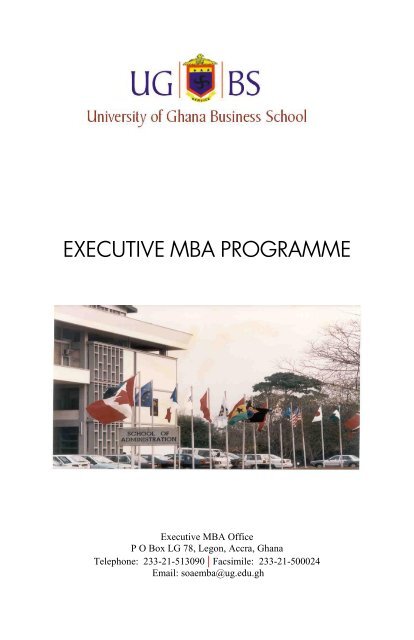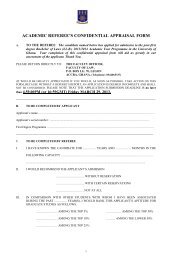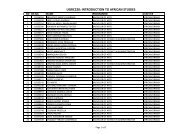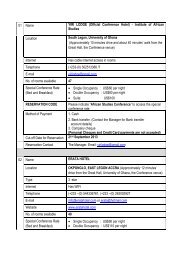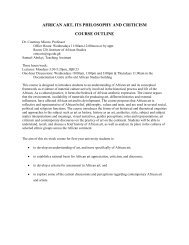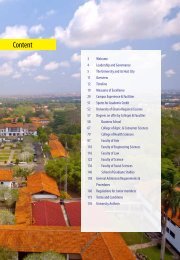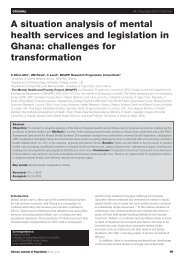EMBA Brochure - University of Ghana Business School
EMBA Brochure - University of Ghana Business School
EMBA Brochure - University of Ghana Business School
You also want an ePaper? Increase the reach of your titles
YUMPU automatically turns print PDFs into web optimized ePapers that Google loves.
EXECUTIVE MBA PROGRAMME<br />
Executive MBA Office<br />
P O Box LG 78, Legon, Accra, <strong>Ghana</strong><br />
Telephone: 233-21-513090 | Facsimile: 233-21-500024<br />
Email: soaemba@ug.edu.gh
Course structure:<br />
Program Options<br />
Admission Requirements<br />
Duration <strong>of</strong> Course<br />
Graduation Requirements<br />
Credit Waivers<br />
Components <strong>of</strong> the Program<br />
Grading System<br />
Core Courses<br />
Accounting Core/Electives<br />
Finance Core/Electives<br />
HRM Core/Electives<br />
Marketing Core/Electives<br />
Project Management Core/ Electives<br />
Entrepreneurial Management Core/ Electives<br />
Course Briefs<br />
2
EXECUTIVE MBA PROGRAMME<br />
To meet the wide range <strong>of</strong> management needs <strong>of</strong> practicing<br />
Executives, <strong>University</strong> <strong>of</strong> <strong>Ghana</strong> <strong>Business</strong> <strong>School</strong> <strong>of</strong>fers a flexible,<br />
fee-paying graduate programme in <strong>Business</strong> Administration for the<br />
continuing education <strong>of</strong> practising executives in the following<br />
disciplines:<br />
1 ENTREPRENEURIAL MANAGEMENT<br />
2 MARKETING<br />
3 HUMAN RESOURCE MANAGEMENT<br />
4 PROJECT MANAGEMENT<br />
5 FINANCE<br />
6 ACCOUNTING<br />
3
ADMISSION REQUIREMENTS<br />
1. A good first degree or an equivalent recognised qualification<br />
2. Applicants must have been in executive positions for at least<br />
5years<br />
Admissions are in February and August each year<br />
DURATION OF COURSE<br />
This ranges between (4) and (6) semesters. Completion time<br />
depends on the Executive student’s ability and motivation to<br />
satisfy the relevant graduation requirements.<br />
GRADUATION REQUIREMENTS<br />
A student must complete at least 48 credits points over a period <strong>of</strong><br />
(4) to (6) semesters.<br />
4
CERDIT WAIVER<br />
Up to 12 credits points may be granted by the Board <strong>of</strong> Graduate<br />
Studies on the recommendation <strong>of</strong> the Board <strong>of</strong> Administration<br />
Studies on being admitted to the Executive MBA programme for<br />
previous academic knowledge in the applicant’s first degree or<br />
pr<strong>of</strong>essional qualification. This has the effect <strong>of</strong> reducing the credit<br />
points required for graduation and therefore the time spent on the<br />
programme.<br />
COMPONENTS OF THE EXECUTIVE MBA PROGRAMME<br />
A total study programme for the Executive MBA degree consists<br />
<strong>of</strong>:<br />
<br />
Core and required Courses<br />
<br />
Electives<br />
<br />
Project<br />
5
GRADING SYSTEM<br />
The grading system applicable to graduate studies <strong>of</strong> <strong>University</strong> <strong>of</strong><br />
<strong>Ghana</strong> is followed under the Executive MBA programme.<br />
PROGRAMME OPTIONS<br />
ACCOUNTING OPTION<br />
YEAR ONE CORE COURSES<br />
• <strong>EMBA</strong> 601 <strong>Business</strong> Economics<br />
• <strong>EMBA</strong> 603 Marketing Management<br />
• <strong>EMBA</strong> 605 Organisational Behaviour& Management<br />
• <strong>EMBA</strong> 607 Information Management<br />
• <strong>EMBA</strong> 609 Accounting<br />
• <strong>EMBA</strong> 612 Human Resource Management<br />
• <strong>EMBA</strong> 635 Ethics in Management<br />
6
YEAR TWO ELECTIVES<br />
<strong>EMBA</strong> 610 Quantitative Methods<br />
<strong>EMBA</strong> 611 Corporate Finance & Risk Management<br />
<strong>EMBA</strong> 615 Management Accounting<br />
<strong>EMBA</strong> 620 Project Work<br />
<strong>EMBA</strong> 665 Accounting Theory<br />
<strong>EMBA</strong> 667 International Accounting<br />
<strong>EMBA</strong> 669 Advanced Taxation<br />
<strong>EMBA</strong> 671 Advanced Auditing<br />
FINANCE OPTION<br />
YEAR ONE CORE COURSES<br />
• <strong>EMBA</strong> 601 <strong>Business</strong> Economics<br />
• <strong>EMBA</strong> 603 Marketing Management<br />
<strong>EMBA</strong> 605 Organisational Behaviour& Management<br />
7
• <strong>EMBA</strong> 607 Information Management<br />
• <strong>EMBA</strong> 609 Accounting<br />
• <strong>EMBA</strong> 612 Human Resource Management<br />
• <strong>EMBA</strong> 635 Ethics in Management<br />
YEAR TWO ELECTIVES<br />
<strong>EMBA</strong> 602 Financial Management<br />
<strong>EMBA</strong> 604 Strategic Management<br />
<strong>EMBA</strong> 610 Quantitative Methods<br />
<strong>EMBA</strong> 611 Corporate Finance & Risk Management<br />
<strong>EMBA</strong> 613 International Finance<br />
<strong>EMBA</strong> 617 Fund Management<br />
<strong>EMBA</strong> 618 International Trade &Investment<br />
<strong>EMBA</strong> 620 Project Work<br />
<strong>EMBA</strong> 673 Money & Capital Markets<br />
8
HUMAN RESOURCE MANAGEMENT OPTION<br />
YEAR ONE CORE COURSES<br />
• <strong>EMBA</strong> 601 <strong>Business</strong> Economics<br />
• <strong>EMBA</strong> 603 Marketing Management<br />
• <strong>EMBA</strong> 605 Organisational Behaviour& Management<br />
• <strong>EMBA</strong> 607 Information Management<br />
• <strong>EMBA</strong> 609 Accounting<br />
• <strong>EMBA</strong> 612 Human Resource Management<br />
• <strong>EMBA</strong> 635 Ethics in Management<br />
YEAR TWO ELECTIVES<br />
• <strong>EMBA</strong> 610 Quantitative Methods<br />
• <strong>EMBA</strong> 614 Comparative Management<br />
• <strong>EMBA</strong> 620 Project Work<br />
<strong>EMBA</strong> 629 Change Management & Organisational<br />
Development<br />
• <strong>EMBA</strong> 649 Strategic Human Resource Management<br />
• <strong>EMBA</strong> 651 International Human Resource Management<br />
• <strong>EMBA</strong> 653 Human Relations in Organisation<br />
• <strong>EMBA</strong> 655 Labour Law & Industrial Relations<br />
9
MARKETING OPTION<br />
YEAR ONE CORE COURSES<br />
• <strong>EMBA</strong> 601 <strong>Business</strong> Economics<br />
• <strong>EMBA</strong> 603 Marketing Management<br />
• <strong>EMBA</strong> 605 Organisational Behaviour& Management<br />
• <strong>EMBA</strong> 607 Information Management<br />
• <strong>EMBA</strong> 609 Accounting<br />
o <strong>EMBA</strong> 612 Human Resource Management<br />
<strong>EMBA</strong> 635 Ethics in Management<br />
YEAR TWO ELECTIVES<br />
• <strong>EMBA</strong> 602 Financial Management<br />
• <strong>EMBA</strong> 604 Strategic Management<br />
• <strong>EMBA</strong> 606 <strong>Business</strong> Environment<br />
• <strong>EMBA</strong> 610 Quantitative Methods<br />
• <strong>EMBA</strong> 616 International <strong>Business</strong> Management<br />
• <strong>EMBA</strong> 620 Project Work<br />
• <strong>EMBA</strong> 623 Consumer Behaviour & Management<br />
10
• <strong>EMBA</strong> 641 International Marketing<br />
• <strong>EMBA</strong> 643 Marketing Research<br />
• <strong>EMBA</strong> 645 Integrated Marketing Communication<br />
• <strong>EMBA</strong> 647 Services Marketing<br />
PROJECT MANAGEMENT OPTION<br />
YEAR ONE CORE COURSES<br />
• <strong>EMBA</strong> 601 <strong>Business</strong> Economics<br />
• <strong>EMBA</strong> 603 Marketing Management<br />
• <strong>EMBA</strong> 605 Organisational Behaviour& Management<br />
• <strong>EMBA</strong> 607 Information Management<br />
• <strong>EMBA</strong> 609 Accounting<br />
• <strong>EMBA</strong> 612 Human Resource Management<br />
• <strong>EMBA</strong> 635 Ethics in Management<br />
11
YEAR TWO ELECTIVES<br />
<strong>EMBA</strong> 604<br />
Strategic Management<br />
• <strong>EMBA</strong> 606 <strong>Business</strong> Environment<br />
• <strong>EMBA</strong> 610 Quantitative Methods<br />
• <strong>EMBA</strong> 617 Fund Management<br />
• <strong>EMBA</strong> 620 Project Work<br />
• <strong>EMBA</strong> 657 Project Management<br />
• <strong>EMBA</strong> 659 Project Evaluation & Impact Assessment<br />
• <strong>EMBA</strong> 661 Total Quality Management<br />
• <strong>EMBA</strong> 663 Project Pr<strong>of</strong>iles<br />
ENTREPRENEURIAL MANAGEMENT<br />
YEAR ONE CORE COURSES<br />
• <strong>EMBA</strong> 601 <strong>Business</strong> Economics<br />
• <strong>EMBA</strong> 603 Marketing Management<br />
12
• <strong>EMBA</strong> 605 Organisational Behaviour& Management<br />
• <strong>EMBA</strong> 607 Information Management<br />
• <strong>EMBA</strong> 609 Accounting<br />
• <strong>EMBA</strong> 612 Human Resource Management<br />
• <strong>EMBA</strong> 635 Ethics in Management<br />
YEAR TWO ELECTIVES<br />
• <strong>EMBA</strong> 602 Financial Management<br />
• <strong>EMBA</strong> 604 Strategic Management<br />
• <strong>EMBA</strong> 606 <strong>Business</strong> Environment<br />
• <strong>EMBA</strong> 610 Quantitative Methods<br />
• <strong>EMBA</strong> 616 International <strong>Business</strong> Management<br />
• <strong>EMBA</strong> 620 Project Work<br />
• <strong>EMBA</strong> 621 Entrepreneurial Management<br />
• <strong>EMBA</strong> 625 Innovation Management<br />
• <strong>EMBA</strong> 627 <strong>Business</strong> Planning<br />
13
COURSE BRIEFS<br />
<strong>EMBA</strong> 601 <strong>Business</strong> Economics<br />
This course will provide students with the principles and tools <strong>of</strong><br />
both micro and macroeconomics to enable them analyse broad<br />
economic issues at the firm, industry and national levels. Topics<br />
to be covered include: models <strong>of</strong> the firm, cost analysis, corporate<br />
growth, inflation and labour market issues.<br />
<strong>EMBA</strong> 602 Financial Management<br />
This course will provide students with the necessary skills for the<br />
finance function within organizations. Topics covered include<br />
capital budgeting, debt and equity funding, dividend policy, project<br />
appraisal, risk and uncertainty assessment.<br />
<strong>EMBA</strong> 603 Marketing Management<br />
Marketing Management is about twin responsibilities <strong>of</strong> managing<br />
the marketing function through the development <strong>of</strong> the ideas and<br />
markets as well as creating and managing the unit known as the<br />
market department. It covers the processes involved in<br />
interpreting market information and integrating the demands <strong>of</strong> the<br />
14
marketing function with the other departments in the business<br />
such as designs, production and purchasing.<br />
<strong>EMBA</strong> 604 Strategic Management<br />
This course is concerned with the decisions and processes by<br />
which managers and executives choose strategies, plans and<br />
options to maximize corporate objectives. The concept <strong>of</strong> a<br />
“strategy” in business raises the decision function beyond the<br />
mundane and routine, this course therefore covers topics such as<br />
competitive advantage, strategic planning, stakeholder’s<br />
assessments, functional and business level strategy and<br />
leadership.<br />
<strong>EMBA</strong> 605 Organizational Behaviour<br />
This course seeks to expose students to the collection <strong>of</strong> theory<br />
and research, which describes explains and seeks to predict<br />
individual and group attitudes, behaviours and understandings in<br />
organizations. It covers such issues as interpersonal relations,<br />
stress, motivation, group and organizational processes,<br />
leadership and managerial behaviour. It serves as a basis for<br />
understanding the human aspects <strong>of</strong> corporate governance.<br />
<strong>EMBA</strong> 606 <strong>Business</strong> Environment<br />
15
Students <strong>of</strong> <strong>Business</strong> Administration need a thorough<br />
understanding <strong>of</strong> the sociocultural, economic, political, global and<br />
financial environment within which their companies exist. This<br />
course therefore provides students with the tools with which to<br />
analyse and understand how national and international economic<br />
variables such as inflation, interest rates, balance <strong>of</strong> payments,<br />
money supply, world trade and government policy affect business.<br />
Theoretical models are used to provide the requisite tools for<br />
analysis, prediction and decision-making,<br />
<strong>EMBA</strong> 607 Information Management<br />
This course aims to provide students with the requisite knowledge<br />
and awareness <strong>of</strong> the importance and impact <strong>of</strong> information and<br />
information systems in today’s organizations. Students will<br />
acquire the skills necessary for developing information, archival<br />
and decision support systems. They will also be exposed to<br />
current applications which are in use and which provide real<br />
competitive advantage to business e.g. Human Resource<br />
Information Systems, Accounting Packages and Database.<br />
<strong>EMBA</strong> 608 Marketing Planning and Strategy<br />
This course concentrates on the methods <strong>of</strong> defining market<br />
segments, determining the appropriate marketing mix, learning to<br />
make and implement effective marketing decision for the short,<br />
medium and long term. Key to this course is skills relevant to<br />
16
segmentation, forecasting and innovation in meeting market<br />
demands.<br />
<strong>EMBA</strong> 609 Accounting<br />
This course seeks to ensure that all MBA graduates have a firm<br />
understanding <strong>of</strong> basic accounting techniques and how company<br />
accounts such as balance sheets; pr<strong>of</strong>it and loss accounts are<br />
constructed. It explores the legal requirements governing the<br />
creation <strong>of</strong> financial statements and explores how to create<br />
accounting systems that ensure sound audit reports.<br />
<strong>EMBA</strong> 610 Quantitative Methods<br />
Present contemporary quantitative tools through business models<br />
in order to prepare students for other course using quantitative<br />
methods. Broad coverage <strong>of</strong> application <strong>of</strong> quantitative analysis to<br />
business and economic problems, including the application <strong>of</strong><br />
probability to managerial decision-making under uncertainty.<br />
Topics will include basic functions peculiar to studying business<br />
(linear, quadratic, some polynomials exponential and logarithmic<br />
functions), algebraic relationships, system <strong>of</strong> equations, linear<br />
programming, estimation, hypothesis testing, regression analysis,<br />
time series analysis and business forecasting. The background <strong>of</strong><br />
the presentation is business models.<br />
17
<strong>EMBA</strong> 611 Corporate Finance and risk management<br />
The term risk in business is generally used to refer to the<br />
uncertainty associated with securing and utilizing the factors <strong>of</strong><br />
production and return on investment (ROI). This course focuses<br />
on the raising and managing <strong>of</strong> corporate finance through various<br />
strategies and helps students to understand the factors associated<br />
with financial risk. It provides tools for managing corporate risks<br />
through risk analysis, decision-making, joint venture ships and<br />
resource control.<br />
<strong>EMBA</strong> 612 Human Resource Management<br />
This course examines key issues in the management <strong>of</strong> people at<br />
work. Using organizational Behaviour theories and concepts as<br />
base, critical people management topics such as staffing, training<br />
and development, compensation and reward systems. At the end<br />
<strong>of</strong> the course, students should have a clear appreciation <strong>of</strong> the<br />
importance <strong>of</strong> the human resource <strong>of</strong> an organization and hence<br />
the human resource function.<br />
<strong>EMBA</strong> 613 International Finance<br />
18
International Finance considers the problems <strong>of</strong> business financial<br />
management from the global perspective. It examines topics such<br />
as international trade regimes, foreign direct investment, global<br />
capital markets, foreign exchange markets and financial<br />
management in the international business.<br />
<strong>EMBA</strong> 614 Comparative Management<br />
The course examines the management practices in different<br />
cultures and national environments.<br />
Its major concern is the<br />
search for the commonalities and differences in management<br />
practices.<br />
Through comparative analysis and cross-cultural<br />
research, the course seeks to investigate the logic in management<br />
development: cultural free theories and cultural specific<br />
factors.<br />
<strong>EMBA</strong> 615 Management Accounting<br />
This course covers the use <strong>of</strong> internally generated accounting<br />
information for the decision-making planning and control. The<br />
course trains students in the concepts and techniques involved in<br />
developing and interpreting accounting information.<br />
<strong>EMBA</strong> 616 International <strong>Business</strong> Management<br />
International Management is the study <strong>of</strong> the management <strong>of</strong><br />
international business operations. Hence it is concerned with the<br />
management <strong>of</strong> multinational organizations. It deals with<br />
problems <strong>of</strong> managing geographically decentralized organizations<br />
19
such as the coordination <strong>of</strong> the activities <strong>of</strong> subsidiaries and in<br />
different national environments, allocating resources between<br />
subsidiaries and development <strong>of</strong> global strategies for multinational<br />
organizations.<br />
<strong>EMBA</strong> 617 Fund Management<br />
This course considers the sources <strong>of</strong> raising corporate funds and<br />
how to invest funds while applying this funds to the core business<br />
<strong>of</strong> the organization. It examines the critical role <strong>of</strong> the Treasurers<br />
position in financial institutions and considers the options available<br />
in the management <strong>of</strong> the corporate financial resources<br />
<strong>EMBA</strong> 618 International Trade and Investment<br />
The course examines the law <strong>of</strong> investment transcending national<br />
boundaries, as well as the legal aspects <strong>of</strong> international private<br />
trade with essentially the perspectives <strong>of</strong> Developing Countries in<br />
mind. Topics covered include the international sales contract for<br />
the carriage <strong>of</strong> goods and letters <strong>of</strong> credit and other forms <strong>of</strong><br />
payment for goods. Others areas discussed are the assumptions,<br />
risks, costs and benefits <strong>of</strong> foreign direct investment, national and<br />
international controls over transnational corporation and the<br />
protection <strong>of</strong> foreign investments through agreements, treaties<br />
and adjudicator processes.<br />
<strong>EMBA</strong> 619 <strong>Business</strong> Policy<br />
20
The course pulls together concepts and skills in all MBA training<br />
into a coherent view <strong>of</strong> the firm. It provides the tools for crafting<br />
policies or blue print for organizational growth, pr<strong>of</strong>itability and<br />
adaptability. The course takes the view that managers have<br />
responsibility to observe, analyse and synthesize their corporate<br />
aims with the opportunities and threats in the government.<br />
<strong>Business</strong> Policy teaches the skills for these activities.<br />
<strong>EMBA</strong> 620 Project Work<br />
For this course students work on a practical business problem<br />
related to their area <strong>of</strong> specialization using the appropriate<br />
theories and concepts <strong>of</strong> their domain to research, and resolve the<br />
problem. The course exposes students to scientific methods,<br />
trains them in research techniques, report writing, which blends<br />
both academic and business approaches, and assist them to<br />
critically apply theory to practice. The project is undertaken under<br />
academic supervision.<br />
<strong>EMBA</strong> 621 Entrepreneurial Management<br />
This course provides awareness to students <strong>of</strong> their<br />
entrepreneurial potential. It focuses on the key principles that<br />
entrepreneurship is fundamental to business and national<br />
success. It sees entrepreneurship as the innovativeness, risktaking,<br />
dedication which leads to business initiation, development<br />
and pr<strong>of</strong>it. Topics to be covered include the nature <strong>of</strong><br />
21
entrepreneurship, the entrepreneurial process and business<br />
ventures.<br />
<strong>EMBA</strong> 622 <strong>Business</strong> Law<br />
This course identifies and explores some to the main types <strong>of</strong><br />
legal considerations that will impinge upon the effective<br />
management <strong>of</strong> business and its operations in practice with<br />
special emphasis on contract law. Examples will be based on the<br />
laws relating to <strong>Ghana</strong>. Topics covered include: the structure and<br />
role <strong>of</strong> the courts and sources <strong>of</strong> law, legal structure <strong>of</strong><br />
organisations, fundamentals <strong>of</strong> contract law, tort and criminal law,<br />
directors and <strong>of</strong>ficers liability, liability for agents etc.<br />
<strong>EMBA</strong> 623 Consumer Behaviour and Sales Strategy<br />
This course studies the socio-psychology <strong>of</strong> the consumer by<br />
covering issues such as perceptions, social class, group influence,<br />
individual and organizational buyer behaviour. This course is key<br />
to marketing manager’s understanding <strong>of</strong> the dynamism as well as<br />
the rigidity <strong>of</strong> the consumer preferences.<br />
<strong>EMBA</strong> 625 Innovation Management<br />
Innovation has two components; the individual elements and the<br />
corporate element. This course examines how managers can<br />
ensure that individual employees remain creative, proactive and<br />
22
problem solving without damaging team effort. The course also<br />
considers how organizations can incorporate into their business<br />
processes external innovations such as information technology<br />
and automation.<br />
<strong>EMBA</strong> 627 <strong>Business</strong> Planning<br />
This course examines the strategies for approaches to and uses<br />
<strong>of</strong> properly formulated business plans. The course therefore takes<br />
a very practical approach to skill delivery by focusing on how to go<br />
from idea formulation through market research to the business<br />
plan documents needed for approaching banks, donors and<br />
funding agencies. It also pulls together thinking from Strategic<br />
Management <strong>Business</strong> Policy to inform the running process.<br />
<strong>EMBA</strong> 629<br />
Change Management and<br />
Organisational Development<br />
This course teaches students critical skills necessary to manage<br />
constant change that today’s organizations go through. The<br />
course considers that change is an ubiquitous element <strong>of</strong><br />
corporate and institutional existence. Managers need to<br />
understand the types <strong>of</strong> change, while these changes affect their<br />
organiazations and skills for managing the changed process.<br />
Related to the change management is the use <strong>of</strong> deliberate<br />
strategies to facilitate the planned growth and development.<br />
23
<strong>EMBA</strong> 631 Performance Contracts<br />
An emerging trend in the public sector is the introduction <strong>of</strong><br />
enterprise and service cultures which seek to ensure that public<br />
servants recognise that while carrying out government directives,<br />
they are in essence providing an administrative and facilitatory<br />
service to the general public. This requires a result and<br />
performance orientation. This course explores the performance<br />
concept and functions, considers means by which to manage and<br />
appraise performance and provide skills for creating mutually<br />
agreed or joint goals and objectives. Performance Contracting<br />
requires that these are all documented, signed <strong>of</strong>f and with clearly<br />
understood sanctions in the event <strong>of</strong> non-performance.<br />
<strong>EMBA</strong> 633 <strong>Business</strong> and Government<br />
This course examines the sometimes strained, but necessarily<br />
symbiotic relationship that exist between business and<br />
central/local government. It examines what the essential business<br />
<strong>of</strong> government is and considers the management and policy skills<br />
and issues which determine the nature <strong>of</strong> government regulatory<br />
and monitory activities.<br />
24
<strong>EMBA</strong> 635 Ethics Management<br />
This course examines the ethical issues which both the public and<br />
private sector managers <strong>of</strong>ten have to grapple with. It<br />
distinguishes between work place ethics, business ethics and<br />
government ethics. It considers the ethical dilemmas and<br />
implications <strong>of</strong> various institutional actions, inactions and reaction<br />
on different sectors <strong>of</strong> civil society and provides decision models<br />
by which to deal with ethical dilemmas.<br />
<strong>EMBA</strong> 637 The Public Sector and Its Political Setting<br />
The course exposes the executives to the different categories<br />
within the public educational establishment, health, institutional<br />
establishment, health, institutions, the judiciary and statutory<br />
bodies by examining their culture and structure it also leads to the<br />
appreciation <strong>of</strong> the peculiarly political and national dimensions <strong>of</strong><br />
the Public Sector Management.<br />
<strong>EMBA</strong> 639 Public Policy<br />
This course considers the nature, import and creation <strong>of</strong><br />
government policy as it relates to the management <strong>of</strong> the various<br />
arms <strong>of</strong> government and the part <strong>of</strong> the economy which consist <strong>of</strong><br />
state-owned institutions, industries and local authorities. It<br />
examines the mechanics <strong>of</strong> relating to implementing agencies and<br />
25
establishing strategies and schemes by which to ensure civil order<br />
and progress.<br />
<strong>EMBA</strong> 641 International Marketing<br />
The world is increasingly becoming a global market place. Firms<br />
and their management must recognise that they are always in<br />
competition with businesses from far flung regions because <strong>of</strong><br />
marketing sales strategies, which place product at the doorstep <strong>of</strong><br />
a worldwide consuming public. This course helps students to<br />
apply concepts such as the globalisation <strong>of</strong> markets, cultural<br />
differences, global advertising including the use <strong>of</strong> Internet, new<br />
product development to the international marketing <strong>of</strong> products<br />
and services.<br />
<strong>EMBA</strong> 643 Marketing Research<br />
This course teaches the application <strong>of</strong> unique research strategies<br />
to marketing problems. It covers such skills as market research,<br />
surveys, psychographics studies, opinion leadership, and the use<br />
<strong>of</strong> census data. Critical skills include questionnaire design,<br />
interview formats and analysis techniques. It also covers the<br />
research skills needed by R&D units for new products<br />
development.<br />
26
<strong>EMBA</strong> 645 Integrated Marketing Communication<br />
This course provides a thorough understanding <strong>of</strong> the<br />
communication element in marketing. Topics to be covered<br />
include planning, marketing communications, advertising, effective<br />
communication strategy, public relations as a tool <strong>of</strong><br />
communication strategies and schemes to ensure civil order and<br />
progress.<br />
<strong>EMBA</strong> 647 Service Marketing<br />
This service sector has been growing in importance in the global<br />
and national economy. The understanding <strong>of</strong> market concepts<br />
and application to various sectors <strong>of</strong> the service industry has<br />
intensified because consumers are better educated, sophisticated<br />
and more demanding. Increased competition has resulted in the<br />
call for the market orientation <strong>of</strong> service firms to ensure long-term<br />
pr<strong>of</strong>it and survival. This course will examine the theoretical,<br />
conceptual, strategic and operational issues pertaining to the<br />
marketing <strong>of</strong> services. At the end <strong>of</strong> this course it will be expected<br />
that students will be familiar with the theoretical and normative<br />
issues <strong>of</strong> marketing services. They should know how to<br />
investigate, assess and resolve quality problems; how to ensure<br />
employee participation in the delivery <strong>of</strong> quality services and how<br />
27
to develop, implement and control pr<strong>of</strong>itable service marketing<br />
strategies.<br />
<strong>EMBA</strong> 649 Strategic Human Resource Management<br />
This course stresses the need for organizations to locate Human<br />
Resource issues within the corporate policy machinery at the<br />
strategic apex. It takes it as key point <strong>of</strong> departure, the belief that<br />
human resources are valuable strategic assets and have to be<br />
planned for, invested in and managed to reduce risk whiles<br />
increasing returns. Skills to be covered include human resource<br />
planning, concept <strong>of</strong> human capital, labour market theories and<br />
job redesign.<br />
<strong>EMBA</strong> 653 Human Relations in Organizations<br />
Human relation deals with those relational and procedural<br />
elements <strong>of</strong> interpersonal and inter group interaction in the work<br />
place. The aim is to build in students a range <strong>of</strong> ‘s<strong>of</strong>t’ skills which<br />
are necessary to create amiable working environment. Topics to<br />
be covered include power, politics, team work, leadership, the<br />
exchange concept, ethics, gender issues and communication.<br />
<strong>EMBA</strong> 655 Labour Law and Industrial Relations<br />
A peaceful labour relations climate is fundamental to staff<br />
productivity, company pr<strong>of</strong>itability and national development. This<br />
28
course examines issues, theories and frameworks governing<br />
labour relations and looks critically at the laws which regulates the<br />
relationship between government, labour and employers.<br />
<strong>EMBA</strong> 657 Project Management<br />
This course provides the essential core skills needed by project<br />
management specialists. The following specific topics will be<br />
covered: the nature <strong>of</strong> projects; the project life cycle including<br />
financial appraisal, project evaluation, risks analysis,<br />
implementation, planning, control and monitoring; legal aspects <strong>of</strong><br />
projects; critical success factors; project management tools and<br />
modeling techniques such as network analysis, resource<br />
scheduling, computer systems and s<strong>of</strong>tware; human resource<br />
management including the leadership and motivation <strong>of</strong><br />
multidisciplinary teams and the selection <strong>of</strong> individuals.<br />
<strong>EMBA</strong> 659 Project Evaluation and Impact Assessment<br />
This course concerns itself with the mechanism by which to wind<br />
down and exit the project phase. It deals with how to leave behind<br />
a working system, project reports, evaluation and impact<br />
assessment. These are generic skills which cut across disciplines<br />
and project peculiarities.<br />
29
<strong>EMBA</strong> 661 Total Quality Management<br />
Total Quality Management is a growing concept in management.<br />
Its central philosophy is that to achieve quality in product and<br />
services, all aspects and staff in the organization mush be<br />
involved in monitoring and implementing quality regimes. Quality<br />
control is thus no longer on isolated event which occurs at the end<br />
<strong>of</strong> a project. It is built into the whole management process.<br />
Students will therefore be exposed to topics including employee<br />
participation, TQM strategies, TMQ leadership, adding value,<br />
benchmarking and building quality into projects.<br />
<strong>EMBA</strong> 663 Project Pr<strong>of</strong>iles<br />
This course defines the project concept and examines how<br />
projects differ in a range <strong>of</strong> organizational settings. Key to this<br />
course is an understanding <strong>of</strong> the pervasive nature <strong>of</strong> projects in<br />
today’s business environment.<br />
<strong>EMBA</strong> 665 Accounting Theory<br />
The course presents accounting as a body <strong>of</strong> knowledge in pursuit<br />
<strong>of</strong> clearer definitions <strong>of</strong> accounting objectives within the framework<br />
<strong>of</strong> a critical examination <strong>of</strong> the broader implications and<br />
foundations <strong>of</strong> financial accounting for corporate and national<br />
economic management. It examines the complex, dynamic and<br />
challenging environment <strong>of</strong> financial accounting and reporting with<br />
30
its constantly conflicting pressures from different constituents<br />
having different interest in financial reporting.<br />
<strong>EMBA</strong> 667 International Accounting<br />
The course is <strong>of</strong> special relevance in the globalized economy with<br />
information explosion. It is targeted towards practicing<br />
pr<strong>of</strong>essional accountants and financial managers <strong>of</strong> multinational<br />
enterprise and international institutions. It extends general<br />
purpose and national oriented accounting in its broadest sense to<br />
international comparative analysis, factors affecting national<br />
accounting principles and practices, accounting, measurement<br />
and reporting issues unique to multinational business<br />
transactions, accounting needs <strong>of</strong> international financial markets,<br />
harmonization <strong>of</strong> world-wide accounting and financial reporting<br />
diversity via political, organizational, pr<strong>of</strong>essional and standardsetting<br />
activities. The course also takes a look at the international<br />
dimensions <strong>of</strong> group accounts or consolidated financial<br />
statements: effects <strong>of</strong> changes in foreign currency rates on<br />
accounting: and comparative financial statement analysis in<br />
international environment.<br />
<strong>EMBA</strong> 669 Advanced Taxation<br />
This course presents the subject matter <strong>of</strong> taxation as a major tool<br />
for socio-economic management at the macro, corporate and<br />
individual financial management levels. At the macro level, topics<br />
such as the structure <strong>of</strong> taxation, tax administration and the<br />
conflicting social, economic and political interests that impact on<br />
31
tax planning and compliance issues within the framework <strong>of</strong> the<br />
major tax statutes in <strong>Ghana</strong> are also discusses.<br />
<strong>EMBA</strong> 671 Advanced Auditing<br />
The course covers some important tools <strong>of</strong> reviewing and<br />
appraising the various functions <strong>of</strong> an organization. The objective<br />
is to identify and report on the opportunities for improvement and<br />
the deficiencies a\which are disclosed. It stresses the<br />
effectiveness <strong>of</strong> internal controls and operating procedures.<br />
Computerized environments will also be examined. The course<br />
will be strongly based on case studies. The focus will be on<br />
effectiveness, efficiency, quality and economy.<br />
<strong>EMBA</strong> 673<br />
Money and Capital Markets<br />
The course deals with the flow <strong>of</strong> funds in both the short and long<br />
term within domestic and international financial markets. It<br />
analyses the money and capital market instruments available in<br />
the country. Sources and uses <strong>of</strong> funds, interest rate theory, and<br />
the role <strong>of</strong> monetary and fiscal policy in providing background for<br />
the interpretation <strong>of</strong> current developments in the financial markets<br />
are also looked at.<br />
32
Graduate Block<br />
33


